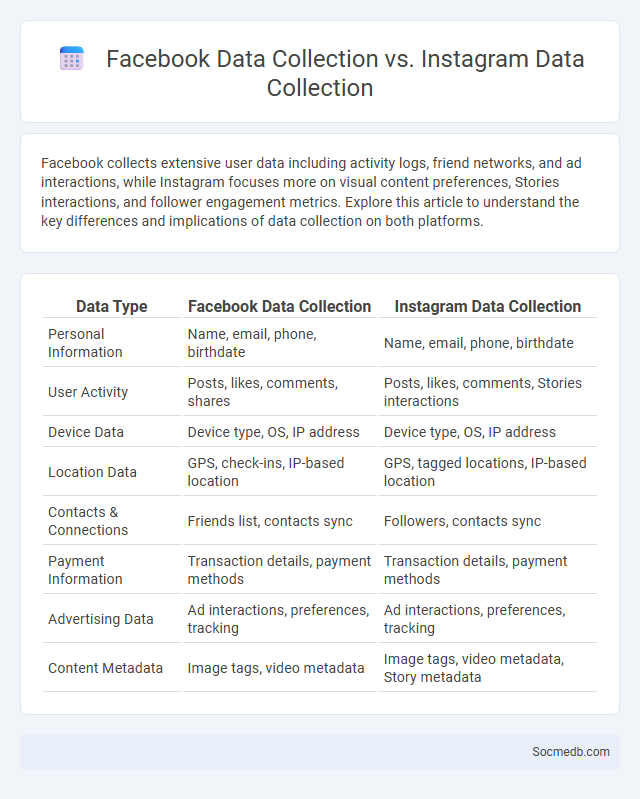
Photo illustration: Facebook Data Collection vs Instagram Data Collection
Facebook collects extensive user data including activity logs, friend networks, and ad interactions, while Instagram focuses more on visual content preferences, Stories interactions, and follower engagement metrics. Explore this article to understand the key differences and implications of data collection on both platforms.
Table of Comparison
| Data Type | Facebook Data Collection | Instagram Data Collection |
|---|---|---|
| Personal Information | Name, email, phone, birthdate | Name, email, phone, birthdate |
| User Activity | Posts, likes, comments, shares | Posts, likes, comments, Stories interactions |
| Device Data | Device type, OS, IP address | Device type, OS, IP address |
| Location Data | GPS, check-ins, IP-based location | GPS, tagged locations, IP-based location |
| Contacts & Connections | Friends list, contacts sync | Followers, contacts sync |
| Payment Information | Transaction details, payment methods | Transaction details, payment methods |
| Advertising Data | Ad interactions, preferences, tracking | Ad interactions, preferences, tracking |
| Content Metadata | Image tags, video metadata | Image tags, video metadata, Story metadata |
Introduction: Understanding Platform Data Practices
Social media platforms collect vast amounts of user data to personalize experiences, target advertising, and improve algorithms. Key data types include location information, browsing habits, and content interactions, which are processed through sophisticated machine learning techniques. Awareness of these data practices enables users to make informed decisions about privacy settings and digital footprints.
What is Facebook Data Collection?
Facebook data collection refers to the process where Facebook gathers information from users' activities, preferences, and interactions both on and off the platform to create detailed profiles. This data includes your likes, clicks, messages, location, device information, and browsing history to personalize content, target advertisements, and improve user experience. Understanding how Facebook collects and uses your data is crucial for managing privacy settings and controlling the type of information you share.
Instagram’s Approach to Data Collection
Instagram's approach to data collection centers on harvesting detailed user information, including location, browsing habits, and interaction patterns to optimize ad targeting and content personalization. The platform employs advanced algorithms to analyze this data, enhancing user engagement and refining marketing strategies for businesses. You benefit from a tailored experience, but should remain aware of privacy implications tied to extensive data gathering.
Comparing Facebook and Instagram Data Policies
Facebook's data policy emphasizes extensive data collection across its platform and third-party sites to enhance ad targeting and user experience. Instagram, owned by Facebook, follows a similar data policy but places a stronger focus on handling visual content and interactions, with detailed tracking of likes, shares, and story views. Both platforms utilize user data for personalized advertising while providing users with controls over privacy settings and data sharing preferences.
Types of Data Collected by Facebook vs Instagram
Facebook collects extensive user data including personal information, location, browsing activity, friends and connections, communication content, and interests to optimize targeted advertising. Instagram, while also gathering profile details, engagement metrics, direct messages, and location data, emphasizes visual content interaction such as likes, comments, and shares on photos and videos. Both platforms utilize this data for personalized ad delivery but differ in the depth and type of user interactions analyzed due to their unique content formats.
Third-Party Data Sharing on Facebook and Instagram
Third-party data sharing on Facebook and Instagram enables advertisers to target your preferences by collecting browsing behavior, location, and interactions from various external websites and apps. This data integration enhances ad personalization but raises important privacy concerns related to user consent and data security. Understanding how these platforms leverage third-party data helps you make informed decisions about your social media settings and online privacy.
User Control and Privacy Options
Social media platforms increasingly offer advanced user control and privacy options to enhance data protection and personalize sharing settings. Features such as customizable audience selectors, two-factor authentication, and encrypted messaging empower users to manage their digital footprint effectively. Regular updates to privacy policies ensure transparency and compliance with global data protection regulations like GDPR and CCPA.
Impact on Your Digital Footprint
Social media platforms significantly influence your digital footprint by continuously generating data about your interactions, preferences, and behaviors. This data shapes how algorithms personalize content, affecting your online visibility and reputation. Managing privacy settings and being mindful of shared content are crucial steps to control the long-term impact on your digital identity.
Risks and Security Concerns
Social media platforms present significant risks including data breaches, identity theft, and privacy invasions that expose users to cyberattacks and unauthorized data harvesting. Security concerns highlight vulnerabilities in account authentication, creating opportunities for phishing, malware distribution, and social engineering scams. Users and organizations must employ strong encryption, multi-factor authentication, and continuous monitoring to mitigate these threats effectively.
Best Practices to Protect Your Digital Footprint
Regularly updating privacy settings on platforms like Facebook, Instagram, and Twitter is essential to control who can access your personal information and posts. Using strong, unique passwords combined with two-factor authentication reduces the risk of unauthorized account access. Avoid sharing sensitive details such as your home address or financial information and be mindful of the digital trail left by comments, likes, and shares to safeguard your digital footprint effectively.
 socmedb.com
socmedb.com